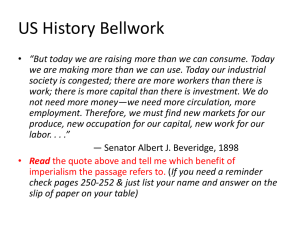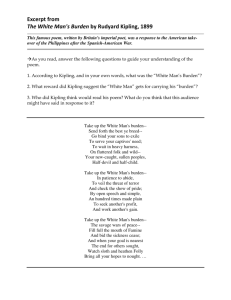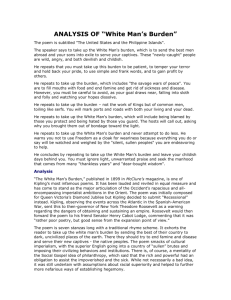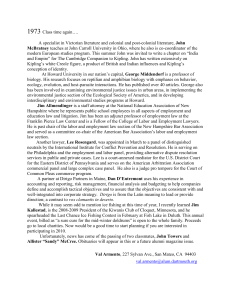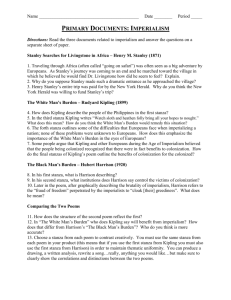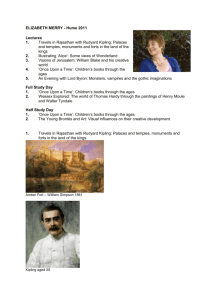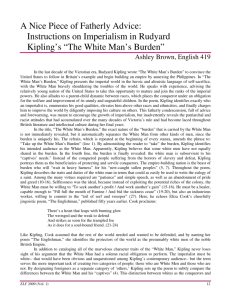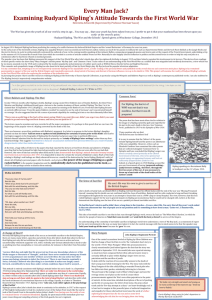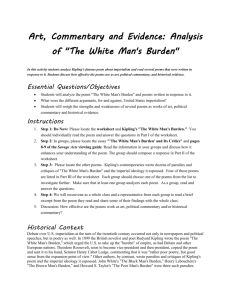Kipling THE WHITE MAN`S BURDEN.doc - Gentili
advertisement
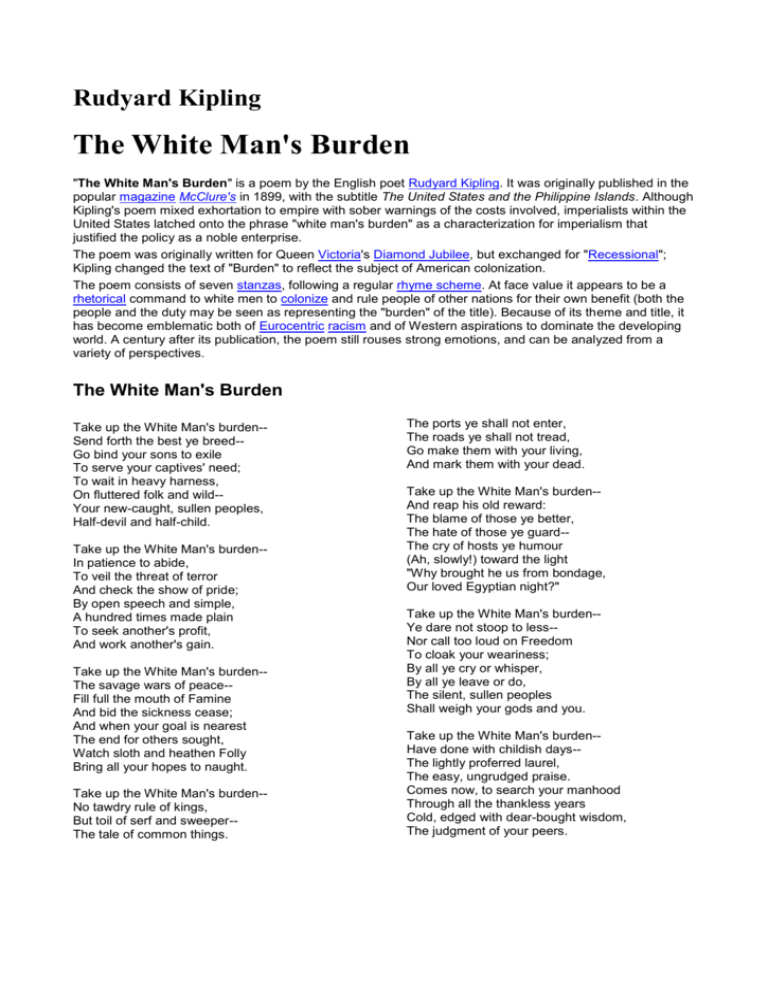
Rudyard Kipling The White Man's Burden "The White Man's Burden" is a poem by the English poet Rudyard Kipling. It was originally published in the popular magazine McClure's in 1899, with the subtitle The United States and the Philippine Islands. Although Kipling's poem mixed exhortation to empire with sober warnings of the costs involved, imperialists within the United States latched onto the phrase "white man's burden" as a characterization for imperialism that justified the policy as a noble enterprise. The poem was originally written for Queen Victoria's Diamond Jubilee, but exchanged for "Recessional"; Kipling changed the text of "Burden" to reflect the subject of American colonization. The poem consists of seven stanzas, following a regular rhyme scheme. At face value it appears to be a rhetorical command to white men to colonize and rule people of other nations for their own benefit (both the people and the duty may be seen as representing the "burden" of the title). Because of its theme and title, it has become emblematic both of Eurocentric racism and of Western aspirations to dominate the developing world. A century after its publication, the poem still rouses strong emotions, and can be analyzed from a variety of perspectives. The White Man's Burden Take up the White Man's burden-Send forth the best ye breed-Go bind your sons to exile To serve your captives' need; To wait in heavy harness, On fluttered folk and wild-Your new-caught, sullen peoples, Half-devil and half-child. Take up the White Man's burden-In patience to abide, To veil the threat of terror And check the show of pride; By open speech and simple, A hundred times made plain To seek another's profit, And work another's gain. Take up the White Man's burden-The savage wars of peace-Fill full the mouth of Famine And bid the sickness cease; And when your goal is nearest The end for others sought, Watch sloth and heathen Folly Bring all your hopes to naught. Take up the White Man's burden-No tawdry rule of kings, But toil of serf and sweeper-The tale of common things. The ports ye shall not enter, The roads ye shall not tread, Go make them with your living, And mark them with your dead. Take up the White Man's burden-And reap his old reward: The blame of those ye better, The hate of those ye guard-The cry of hosts ye humour (Ah, slowly!) toward the light "Why brought he us from bondage, Our loved Egyptian night?" Take up the White Man's burden-Ye dare not stoop to less-Nor call too loud on Freedom To cloak your weariness; By all ye cry or whisper, By all ye leave or do, The silent, sullen peoples Shall weigh your gods and you. Take up the White Man's burden-Have done with childish days-The lightly proferred laurel, The easy, ungrudged praise. Comes now, to search your manhood Through all the thankless years Cold, edged with dear-bought wisdom, The judgment of your peers. Differing interpretations The white man's burden - The Journal, Detroit, 1923. A straightforward analysis of the poem may conclude that Kipling presents a Eurocentric view of the world, in which non-European cultures are seen as childlike. This view proposes that white people consequently have an obligation to rule over, and encourage the cultural development of people from other ethnic and cultural backgrounds until they can take their place in the world by fully adopting Western ways. The term "the white man's burden" has been interpreted as racist, or taken as a metaphor for a condescending view of nonWestern national culture and economic traditions, identified as a sense of European ascendancy which has been called "cultural imperialism". An alternative interpretation is the philanthropic view, common in Kipling's formative years, that the rich have a moral duty and obligation to help "the poor" "better" themselves whether the poor want the help or not. Within a historical context, the poem makes clear the prevalent attitudes that allowed colonialism to proceed. Although a belief in the "virtues of empire" was wide-spread at the time, there were also many dissenters; the publication of the poem caused a flurry of arguments from both sides, most notably from Mark Twain and Henry James. While Kipling may have intended the piece as a form of satire, much of Kipling's other writing does suggest that he genuinely believed in the "beneficent role" which the introduction of Western ideas could play in lifting non-Western peoples out of "poverty and ignorance”. Lines 3-5, and other parts of the poem suggest that it is not just the native people who are enslaved, but also the "functionaries of empire", who are caught in colonial service and may die while helping other races "less fortunate" than themselves. An analysis focused on the social status and background of colonial officers active at the time is lacking; as is one of the Christian missionary movement, also quite active at the time in parts of the world under colonial rule (e.g. the Christian and Missionary Alliance) which also emphasized the theme of aiding those "less fortunate." Some commentators also point to Kipling's history of satirical writing, and suggest that "The White Man's Burden" is in fact meant to undermine imperialism. Chris Snodgrass, in A Companion to Victorian Poetry describes Kipling's poetry as "imperial sensibilities with wry irony and skepticism, viewing all human endeavors as ultimately transitory". Kipling also wrote many poems celebrating the working classes, particularly the common soldier. Six months after "The White Man's Burden" was published, he wrote "The Old Issue", a stinging criticism of the Second Boer War, and an attack on the unlimited, despotic power of kings. The Norton Anthology of English Literature argues it is no satire, but in line with Kipling's strong imperialism and a belief of a "Divine Burden to reign God's Empire on Earth", that other, less Christian nations would otherwise take. Still, some find Kipling's work fascinating because his pro-imperialist stance did not blind him to the less glamorous and more perilous aspects of imperialism. According to Steve Sailer, writer John Derbyshire has described Kipling as "an imperialist utterly without illusions about what being an imperialist actually means. Which, in some ways, means that he was not really an imperialist at all."
